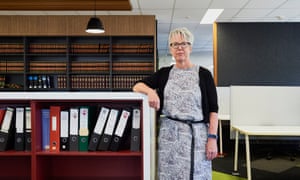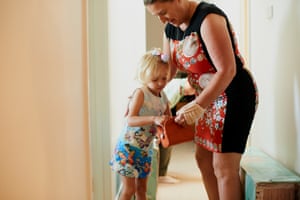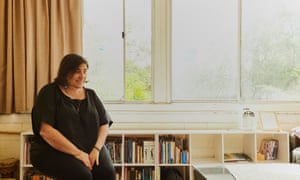Extract from The Guardian
Childcare is central to a functioning society, yet its largely female
workforce is underpaid and undervalued. It’s not just a women’s issue
by Neha Kale
by Neha Kale
Sandra
Bell knows that being dedicated to your vocation can mean paying a
price later in life. In 1980 Bell co-founded Randwick Occasional Care
for Kids (Rock), a daycare centre in Sydney’s eastern suburbs with a
group of women. At the time, she hoped to ease the childcare
responsibilities faced by the area’s working mothers. She didn’t predict
that this mission would involve a material cost.
“I started out doing casual childcare work and [my job] just grew from there,” says Bell, who turns 70 this month. “At the moment, we have eight babies in a room with two staff and it’s draining physically and emotionally. Our wages are ridiculous. We educate these children, we’re not babysitting. I’ve been working at this centre for 38 years and have been a single mum for 30. I have a mortgage and no hope of retiring. I have to keep working as long as I can, until my health tells me otherwise.”
Bell’s decision to pursue a career in childcare – an industry that’s central to a functioning society – means living with the consequence of wages as low as $21.29 an hour. On Tuesday she’ll walk off the job in solidarity with thousands of early childhood educators around the country.
This strike, the third in 12 months, is one of the boldest in the sector’s history and follows the Fair Work Commission’s dismissal, last month, of a five-year fight for a 35% pay rise. The commission found there was no evidence childcare educators were paid less than men performing work of comparable value.
“The equal pay case with the Fair Work Commission argued that early educators have been paid less because of their gender but that’s now been taken away from us,” says Helen Gibbons, the assistant national secretary of childcare workers’ union United Voice.
“There are 100,000 early educators in Australia who can’t achieve fair remuneration without government involvement. Either funding goes up or costs go up and parents already pay high fees. The industry is full of degree-qualified women committed to their careers but we joke that as soon as you have your own child, you can’t afford to work in childcare. So far, the government hasn’t been engaging.”
Unliveable wages are only one symptom of a larger cultural malaise. Given that 95% of the industry is female, the strike also protests the devaluation of what has historically been seen as low-skilled women’s work. While academic studies overwhelmingly point to the vital importance of early childhood care, witness such attitudes as that espoused last year by Liberal Democrat senator David Leyonhjelm who characterised the work as “wiping noses and stopping the kids from killing each other”.

“I started out doing casual childcare work and [my job] just grew from there,” says Bell, who turns 70 this month. “At the moment, we have eight babies in a room with two staff and it’s draining physically and emotionally. Our wages are ridiculous. We educate these children, we’re not babysitting. I’ve been working at this centre for 38 years and have been a single mum for 30. I have a mortgage and no hope of retiring. I have to keep working as long as I can, until my health tells me otherwise.”
Bell’s decision to pursue a career in childcare – an industry that’s central to a functioning society – means living with the consequence of wages as low as $21.29 an hour. On Tuesday she’ll walk off the job in solidarity with thousands of early childhood educators around the country.
This strike, the third in 12 months, is one of the boldest in the sector’s history and follows the Fair Work Commission’s dismissal, last month, of a five-year fight for a 35% pay rise. The commission found there was no evidence childcare educators were paid less than men performing work of comparable value.
“The equal pay case with the Fair Work Commission argued that early educators have been paid less because of their gender but that’s now been taken away from us,” says Helen Gibbons, the assistant national secretary of childcare workers’ union United Voice.
“There are 100,000 early educators in Australia who can’t achieve fair remuneration without government involvement. Either funding goes up or costs go up and parents already pay high fees. The industry is full of degree-qualified women committed to their careers but we joke that as soon as you have your own child, you can’t afford to work in childcare. So far, the government hasn’t been engaging.”
Unliveable wages are only one symptom of a larger cultural malaise. Given that 95% of the industry is female, the strike also protests the devaluation of what has historically been seen as low-skilled women’s work. While academic studies overwhelmingly point to the vital importance of early childhood care, witness such attitudes as that espoused last year by Liberal Democrat senator David Leyonhjelm who characterised the work as “wiping noses and stopping the kids from killing each other”.

“If we only see it as a women’s issue, we ignore working fathers but also the community,” says Gibbons. “Primary school is seen as a social responsibility. Early education enables women and men to go to work and young children to learn. The government is not seeing that.
“I want them to sit down with us and come up with a solution. The last two strikes have raised the profile of early educators. It’s made parents understand our fight.”
Mel Armstrong-Jones, 47, a self-employed MC, celebrant and facilitator with a 10-year-old son and five-year-old daughter says early childhood educators played an indispensable role in her life as new mother. They also helped set the stage for the trajectory of her working life.
“I had a traumatic birth and when my son was just out of the hospital and having support for a few hours was so important to my recovery,” she says. “Our local centre in Seaforth was high-quality and even half a day was enough to recover from lack of sleep. The educators we met had so much wisdom, empathy and kindness for our family and child. Later, it allowed me to work which gave me the sense of still being in the world. It’s so easy to undervalue the support families need especially when we’re often so removed from grandparents.”

Kirstie Fildes, 42, works in a leadership role at a daycare centre in south-west Brisbane. Fildes, who gained her qualifications in 1996 and has spent 16 years as an early childhood educator is fuelled by the opportunity to shape young children for the better. But she’s also reached a crossroads. She’s exhausted by a lack of acknowledgment of the complexity of her profession and financial circumstances that leave her scared that she won’t be able to provide for her teenage girls.
“People think that childcare is just wiping children’s noses but they don’t see the programming, all the studying, the knowledge of educational theories – we’re in a lower socio-economic area and work in partnership with families because frontline services are starting to disappear,” she says.
“Your heart breaks when you hear some of the kid’s stories but sings when they reach a milestone. A lot of educators are struggling, paying for their professional development out of their pockets. We’re putting in these hard yards sometimes at the cost of our own children. I’ve got two girls at home. I love what I do but don’t know if I’ll be able to support them if I continue.”
"We’re not just kind ladies who look after children. We believe in our rights"
Fildes isn’t the only one facing this decision. In June 2016, a nationwide Queensland University of Technology survey found that one out of every five workers in the sector planned to find a new job in the next 12 months.
Research from the World Economic Forum tells us that a child’s interactions with the adults who educate and look after them in early childhood can profoundly affect their socio-emotional skills and future development. In Australia, as in Britain and the US, this value has never translated to financial compensation – despite the fact that early childhood educators, who increasingly hold university degrees comparable to primary-school teachers, have heavy professional responsibilities.
As Helen Gibbons, who studied to be a teacher before working with one and two-year-olds says: “There’s nothing like the energy and wonder of that age group – you see yourself making a real difference.”
There’s also a growing body of evidence to prove that high-quality early childcare can alter the lives of children from disadvantaged backgrounds. Research conducted around the UK’s Sure Start program found that two years of participation in high-quality childcare education before starting school equals better health and creates the same developmental advantage as a tertiary-educated mother. Starting Strong, a 2017 report by the OECD reveals that children from marginalised families reap the greatest benefits from high-quality early education.
“Our educators spend a lot of time creating a curriculum plan according to the Early Years Learning Framework (EYLF), they design an environment that creates a sense of wonder, they have to keep up with the demands of regulations,” says Debbie Zurst, 54, the director of Clovelly Child Care Centre, a community-based centre that – all-too-rare in this industry – counts three male employees.

“Traditionally, childcare and education have been split in Australia and working parents need someone to care for their child. But we provide both education and care and emotional care is as vital for development and cognition. It’s very complex.”
Too often, caring for children is still seen as an extension of female nature rather than a form of unpaid labour that has largely benefited men throughout history. As Nancy Fraser puts it in an October 2015 New York Times interview, valuing childcare means challenging the “institutionalised separation of two supposedly distinct kinds of activity: so-called productive labour, historically associated with men and remunerated by wages and on the other hand, ‘caring’ activities, often historically unpaid and still performed mainly by women.”
In Australia, the statistics about women’s financial trajectories underline the insecurity facing childcare workers: A 2016 report from the Council to Homeless Persons found that a single woman on the average weekly wage ($882 according to 2016 ABS statistics – nearly $500 a week less than male counterparts) couldn’t afford to rent 75% of one-bedroom apartments in Melbourne; a July 2017 Australian Services Union study found that women retire with about 53% less superannuation than men, affecting their ability to maintain quality of life as they retire — thanks, in part, to a system that was conceived to support working fathers.
“We don’t get paid a living wage – one of my educators had cancer and post-chemo, couldn’t afford the dentist,” says Zurst, who moved to Australia from South Africa 23 years ago and has given up the prospect of owning her own home. “I’m hoping for the government to subsidise early childhood learning, to free parents from exorbitant fees, to raise the wage of educators and attract more people of both genders. We’re not just kind ladies who look after the children. We believe in our rights.”
No comments:
Post a Comment